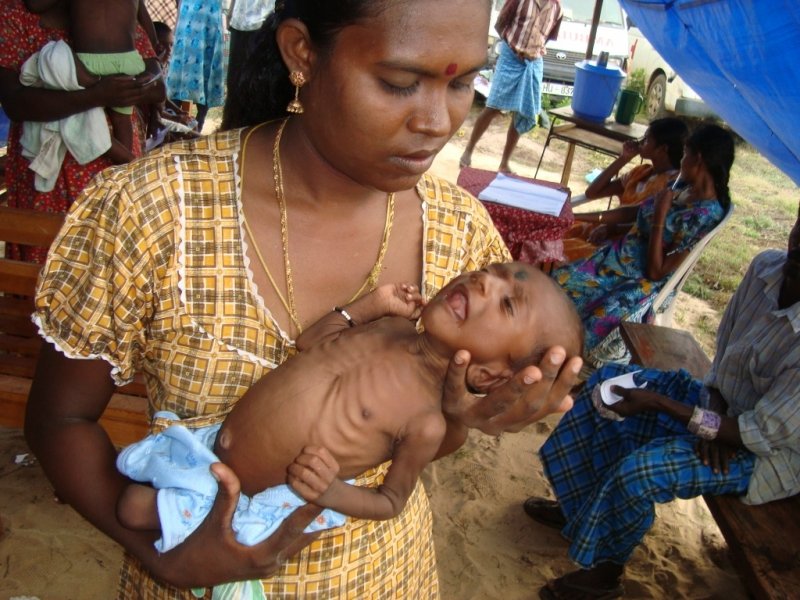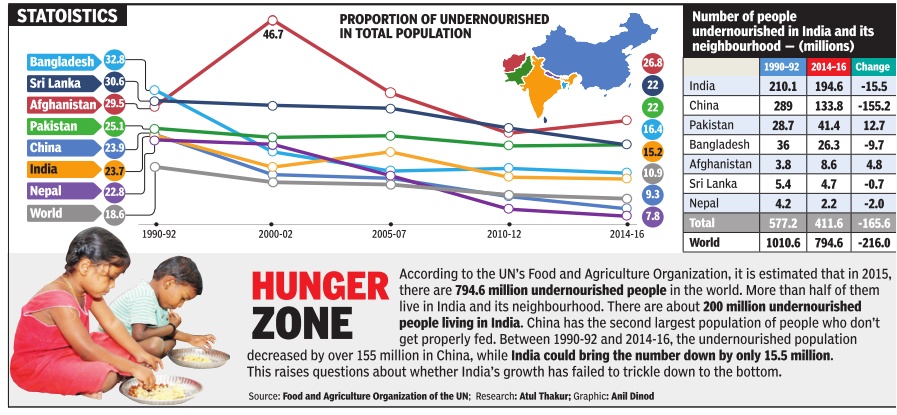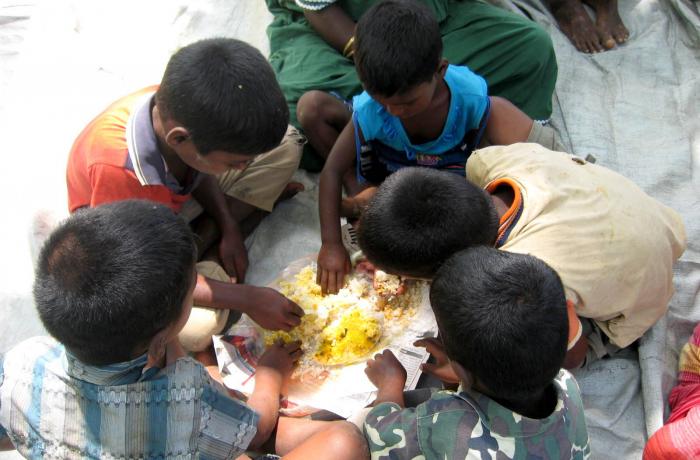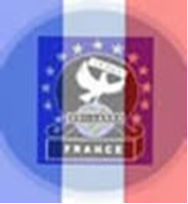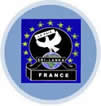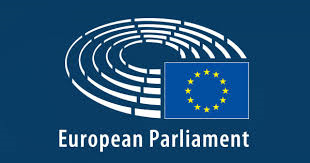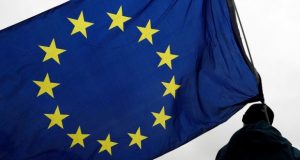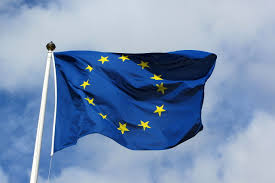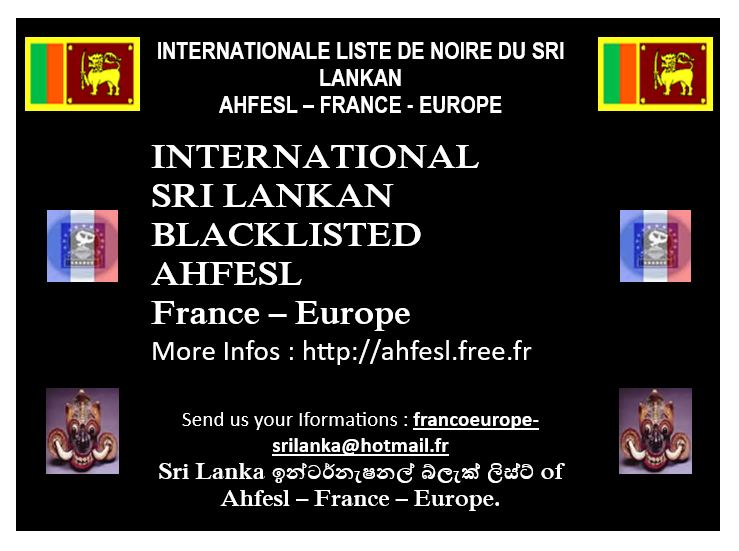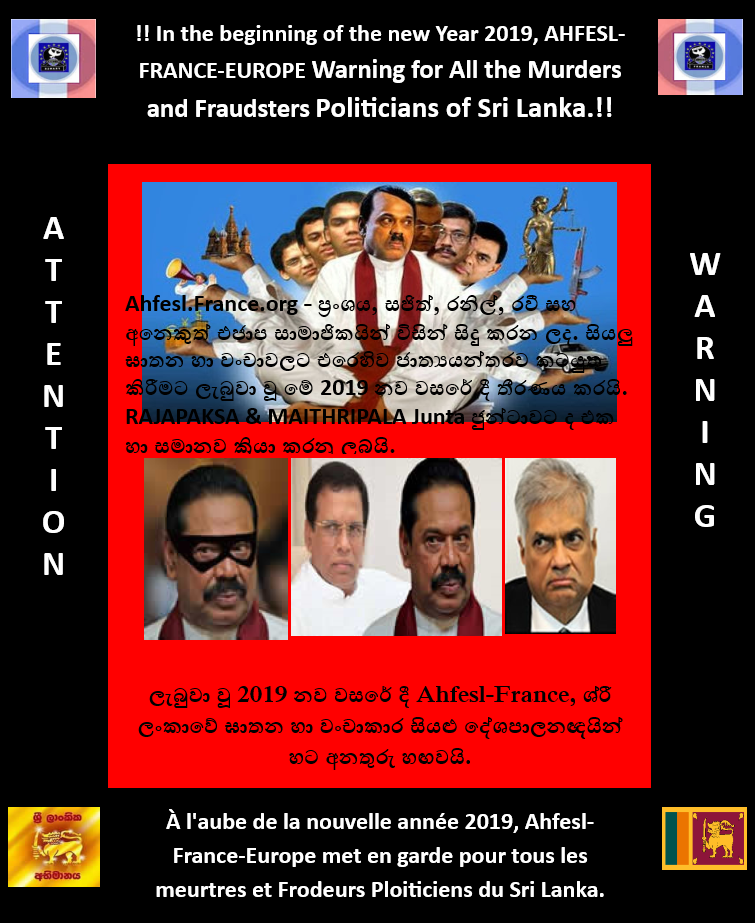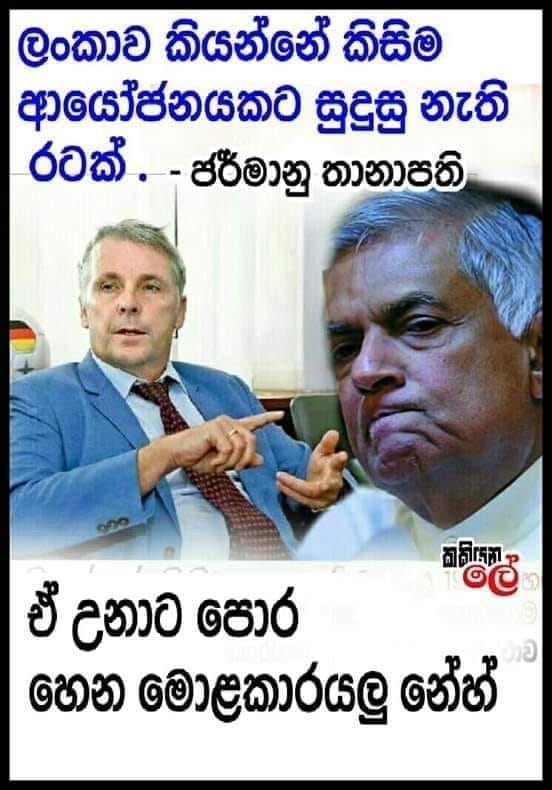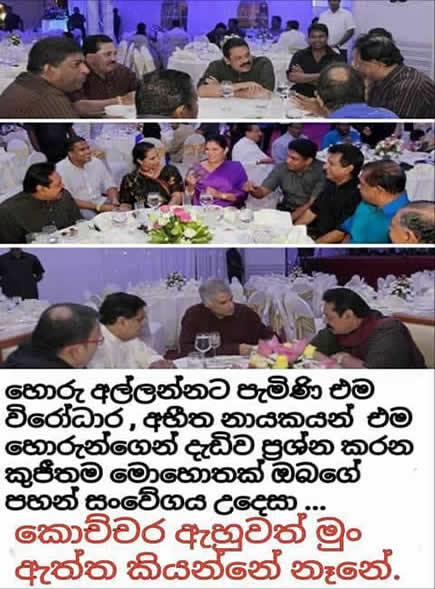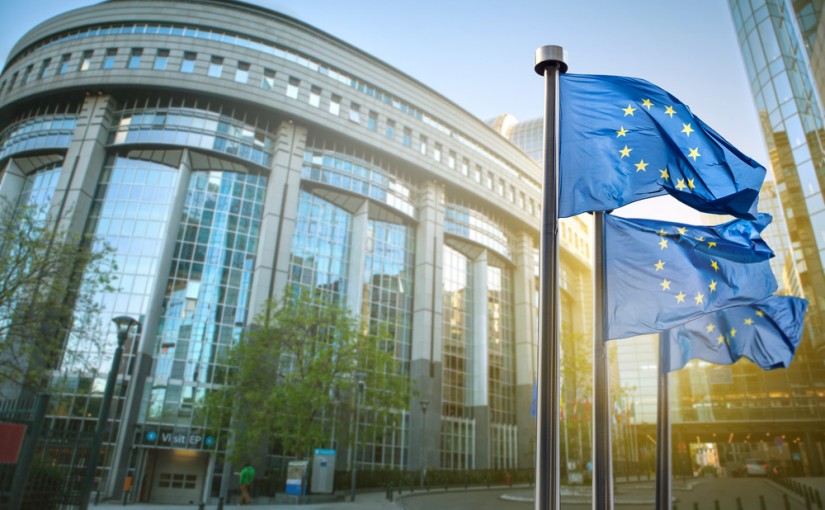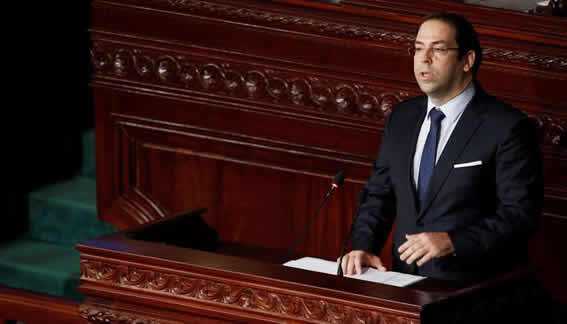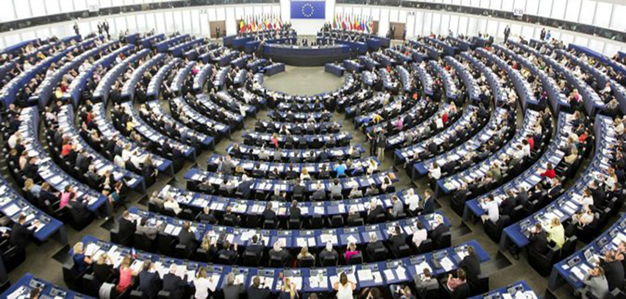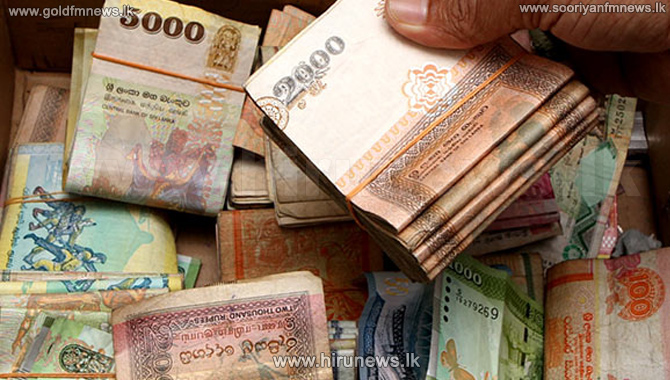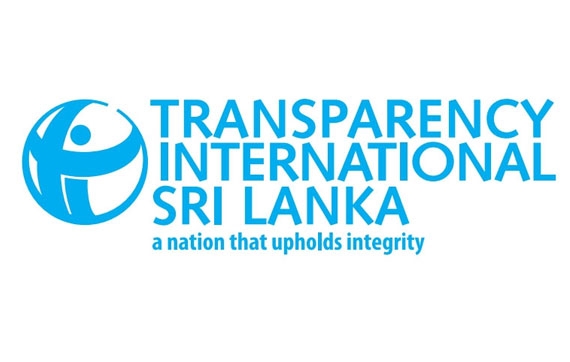 |
 |
 |
 |
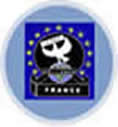 |
!! SRI LANKA ON BLACKLISTED BY EUROPEAN COMMISSION- 2019 February !! !! (Sri Lanka sur la liste de noire, par le Commission Européene -2019 féverier) !! Confirmation by press National and International : Confirmation par les presse Nationale et International (We find those with (Nous trouvons ceux avec) - English + French + Sinhala press) |
|---|
By Mr. president of Ahfesl.org, Sarath Samarakoon (Mr. SMS in France-Europe).
The EU has prepared a list of 23 countries with strategic deficiencies in their anti-money laundering and counter-terrorist financing frameworks for 2019 and Sri Lanka has been placed 8th in this list. However, Bosnia-Herzegovina, Guyana, Laos, Uganda, and Vanuatu have been taken away from the 2019 list while Pakistan, Iran, and Syria have been placed at the top of the list. Sri Lanka has also been included in a list of 12 countries red-flagged by the Financial Action Task Force which is a body used by the EU __________________________________________ Sri Lanka inclus dans la liste noire financière de l'UE
L’Union européenne a pris des mesures pour placer le Sri Lanka au 8ème rang des pays du blanchiment de capitaux et du financement du terrorisme. Sri Lanka a été incluse dans la liste en raison de l'échec de la mise en œuvre de la recommandation présentée par l'UE pour prévenir le terrorisme dans le pays. L'UE a préparé une liste de 23 pays présentant des lacunes stratégiques dans leurs cadres de lutte contre le blanchiment de capitaux et le financement du terrorisme pour 2019 et le Sri Lanka a été classé 8ème sur cette liste. Cependant, la Bosnie-Herzégovine, le Guyana, le Laos, l'Ouganda et le Vanuatu ont été retirés de la liste de 2019, tandis que le Pakistan, l'Iran et la Syrie ont été placés en tête de liste. Sri Lanka a également été incluse dans une liste de 12 pays signalés par le groupe d'action financière, un organe utilisé par l'UE. ________________________________________________ යුරෝපා සංගමය බැංකු කටයුතු සඳහා අවධානම් රටක් ලෙස ලංකාව නම් කරයි
මූල්ය විශුද්ධිකරණය සහ ත්රස්තවාදී මූල්යකරණය සඳහා අවධානම් පවතින ලැයිස්තුවේ 8 වැනි ස්ථානයට ශ්රී ලංකාව නම් කිරීමට යුරෝපා සංගමය කටයුතු කර තිබේ.
https://www.google.com/search?source=hp&ei=p_FrXJLPAo-ca83rgagD&q=Sri+Lanka+included+in+EU%E2%80%99s+financial+blacklist&btnK=Recherche+Google&oq=Sri+Lanka+included+in+EU%E2%80%99s+financial+blacklist&gs_l=psy-ab.3...17194.17194..23254...0.0..1.278.603.0j2j1......0....2j1..gws-wiz.....0.uTVgLywQSzc |
|---|
(This Blacklisted page on under Construction, Please Wait!)
Ahfesl-France Editor Board-Paris (21.02.2019 ) |
Sri Lanka is Paradise of Thieves Politicians !!
Le Sri Lanka est le paradis des politiciens Voleurs
________
All the thieves of Poiltical Parties, are together in the same Table
Tous les Voleurs de partis politique, sont ensemble, dans même Table
Ahfesl-France |
Sri Lanka is a County Undesirable for any Business Venture ( Sri Lanka est un pays indésirable pour toute Entreprise)
Ambassador of Germany in Sri Lanka : (L'Ambassadeur d'Allemagne au Sri Lanka) (Published from Facebook)
!! ශ්රී-ලංකාවේ සියලු දේශපාලන පක්ෂ හොරු එකම කෑම මේසයේ !! |
|---|
!! SRI LANKA ON BLACKLISTED BY EUROPEAN COMMISSION- 2018 February !! !! (Sri Lanka sur la liste de noire, par le Commission Européene -2018 féverier) !! Confirmation by press National and International : Confirmation par les presse Nationale et International (We find those with (Nous trouvons ceux avec) - English + French + Sinhala press) |
|---|
!! යුරෝපා සංගමයේ 2018 මුදල් විශුද්ධිකරණ (Blackliste) අසාදු ලේඛනයට ශ්රී ලංකාවද ඇතුළත් වීම හෝ යෝජනාවීම ඉතිහාසයේ සිදු නොවූ අති විශාලතම සිංහල ජාතික-ආගමික-සංස්කෘතික ජාත්යන්තර අපහාසය මෙය වේ !!
!! වර්තමානයේ ශ්රී ලංකාව, යුරෝපීය කොමිසම විසින් (Blacksited) ලැයිස්තුගත කර ඇත. මේ හරහා යුරෝපියනට ඉදිරියේදී අත්යාවශ්ය නම් ජාත්යන්තර බැංකු ණය සහ පරිත්යාග සියල්ලම නතර කළ හැකි වනු ඇත. සමහරවිට ඔවුන් ශ්රී'ලංකාවට බොහෝ ආර්ථික සම්බාධක (Economic embargo) ද පැනවිය හැකිය. එවිට අප-ඔබ හැම ශ්රී ලාංකිකයෙකුගේ ම අනාගතයට, ආර්ථකයට, සෞඛ්ය'ය සහ ජීවන රටාවන්ගේ තත්ත්වයන්ට කුමකින් කුමක් වෙයි ද?
(මෙම සියලු සත්ය තොරතුරු අප සංවිධානයේ ගරු සභාපති සරත් සමරකෝන් මහතාගේ 40 වසරක ඉටුකරනු ලැබූ යුරෝපා-ලාංකීය දේශපාලනමය සහ විවිධ සමාජ සේවා ඔස්සේ ලබපු අත් දැකීම් සහ එතුමාගේ අදහස් අනුව අප Ahfesl Paris France කතෘ මණ්ඩළයේ අනුග්රහයෙන් 24.02.2018 වන දින ලියා දන්වන වගයි. මෙහි අඩංගු විය යුතු ගරු එතුමාගේ තව බොහෝ වටිනා අර්ථවත් අදහස් ඇතත් අප සතු කාලවේලාව බොහෝ සීමිත බැවින් අදට මෙපමණයි.) Ahfesl.org - Editor board - Paris - section - Le 24.02.2018
|
|---|
Estimated one million children go hungry in Sri Lanka, warns NGO (On estime qu'un million d'enfants ont faim au Sri Lanka, met en garde une ONG)
|
|---|
(මෙම ජාත්යන්තර මාධ්ය ලිපි සියල්ලම කියවන්න: CLICK HERE)
Ahfesl.org - Editor board - Paris section - Le 12.02.2018 |
|---|
!! නිසි අවංක සැබෑ දේශපාලන ක්රම වේදයන් දැන ගන්නට නම් වංචනික දේශපාලකයන් සහ ඔවුනට ආවඩන කිසිම වංචනික ජනමාධ්යයන් මවා පාන අසත්ය ප්රචාරයන්ට කිසිවිටක නොරැවටෙන්න අද සිට ඔබත් වග බලා ගන්නට - හිතට ගන්න !!
|
|---|
Sri Lanka on European Commission’s Money Laundering Blacklist
By Keshala Dias COLOMBO (News1st) – Sri Lanka has been added to the European Commission’s ‘Money Laundering Blacklist’. Sri Lanka, Tunisia, Trinidad and Tobago are newest inclusions to the European Commission’s list of non-EU countries, considered to have strategic deficiencies in their anti-money laundering and terrorism financing regimes. The other countries in the black list are Uganda, Afghanistan, People’s Democratic Republic of Lao and Guyana. Prime Minister of Tunisia Youssef Chahed has sacked the Governor of the country’s Central Bank, Chedly Ayari. Below is what the Former Chairman of the Ceylon Chamber of Commerce, Chandra Jayaratne said: “In these dealings if we do not meet up to the required standards, we will be penalised. And these penalties could impact upon the country’s sovereign rating as well as the country’s banking systems’ ability to trade and transact international finances. It is important that all stake holders, the banking sector, and the other private sector as fellow professionals play their due role in making sure that Sri Lanka is a country that is compliant with the standards”. |
|---|
MEPs confirm Commission blacklist of countries at risk of money laundering
Tunisia, Sri Lanka and Trinidad and Tobago added to money laundering blacklist List is part of EU’s toolkit to protect itself against money laundering, terrorist financing Long record of disagreement between Parliament and Commission over compilation Despite fierce opposition, Tunisia has been added to the European blacklist of third countries thought to be at “high risk” of money laundering and terrorist financing. Despite intense efforts by some MEPs, they failed to achieve the 376-vote absolute majority needed to reject the inclusion of Tunisia, Sri Lanka, and Trinidad and Tobago to the European Commission’s list of non-EU countries considered to have strategic deficiencies in their anti-money laundering and terrorism financing regimes. The vote on Wednesday reflected the split in Parliament over the issue, with 357 votes in support of the motion, to 283 votes against, and 26 abstentions. MEPs who tabled the motion focused their opposition on the inclusion of Tunisia. They believe the addition of the North African country is undeserved; that it is a burgeoning democracy in need of support and that the listing fails to recognise the recent steps it has taken to strengthen its financial system against criminal activity. The other two countries were included in the same delegated act. Commission obligations under the AMLD As part of its obligations under the EU’s Anti-Money Laundering Directive, the European Commission is periodically obliged to draw up a list of “high-risk third countries”. Parliament has veto power over the blacklist, which is one of the tools in the European Union’s armoury to protect its financial system against money laundering and terrorist financing. However, for many months, the list has been a source of disagreement between the European Commission and Parliament. MEPs rejected two previous versions, after disagreements over the methodology used by the Commission for compiling the list. Since then, the two bodies have agreed on a new methodology, which will be introduced from the end of this year, for adding and removing countries. In mid-December, in line with its custom of following the lead of the international Financial Action Task Force (FATF), the Commission decided to include Tunisia and the other two states to its blacklist, sparking the present controversy. In a statement to Parliament on Monday, the Commissioner for Justice, Consumers and Gender Equality, Vera Jourová, declined some MEPs’ requests to delist Tunisia immediately. She said the Commission would reassess the country’s progress “as early as possible” this year. “However, we are not there yet,” she added. |
|---|
EU Parliament adds three jurisdictions to money laundering blacklist
Categories: Africa, Europe, Governmental, Latest Press, Money Laundering, Sri Lanka, Terrorism Financing, Tunisia
|
|---|
ompte rendu
L’UE inscrit la Tunisie sur sa « liste noire » des pays exposés au financement du terrorisme http://www.lemonde.fr/afrique/article/2018/02/08/l-ue-inscrit-la-tunisie-sur-sa-liste-noire-des-pays-exposes-au-financement-du-terrorisme_5253950_3212.html
Le Parlement européen a rejeté mercredi une motion demandant le retrait de cette liste de la Tunisie. Le directeur de la banque centrale va être démis pour sanctionner ce raté. Cette mise à l’index survient deux mois après l’inclusion de la Tunisie dans une autre liste noire, celle des paradis fiscaux, établie par les ministres européens des finances. Le dommage infligé à l’image de la Tunisie avait toutefois été ensuite réparé. Le 23 janvier, l’UE retirait le petit pays d’Afrique du Nord de cette liste de mauvais élèves en matière de lutte contre l’évasion fiscale. Entre-temps, la machine diplomatique tunisienne, initialement peu réactive, s’était remobilisée en s’engageant à entreprendre les réformes fiscales requises, notamment dans le secteur des entreprises exportatrices offshore. Le coup à peine encaissé, le vote du Parlement de Strasbourg adresse une nouvelle semonce à la Tunisie, cette fois sur la lutte contre le blanchiment d’argent et le financement du terrorisme. Une motion déposée par des députés visant à retirer la Tunisie, le Sri Lanka et Trinité-et-Tobago de la liste noire établie par la Commission n’a pas recueilli la majorité requise des 376 voix. Les débats, très intenses, se sont surtout focalisés sur la Tunisie, unique rescapée de la vague des révolutions arabes de 2011. Les défenseurs de la motion n’auront manqué que de 19 voix pour la faire adopter. « Beaucoup d’élus ont été sensibles, y compris chez les conservateurs et les sociaux-démocrates, à l’argument selon lequel il ne faut pas enfoncer une démocratie fragile, rapporte une source interne au Parlement. Mais il s’agit quand même des risques de financement du terrorisme. Seuls les arguments techniques devraient prévaloir. » De fait, c’est l’approche experte et non politique qui s’est imposée au Parlement européen à travers le rejet de cette motion « pro-Tunisie ». A Tunis, la conséquence a été immédiate. Le premier ministre, Youssef Chahed, a fait savoir, mercredi, qu’il entendait limoger le directeur de la banque centrale de Tunisie, Chedly Ayari, jugé responsable de l’impréparation de son pays sur ce dossier. L’inquiétude avait commencé à monter en novembre 2017, quand le Groupe d’action financière (GAFI) a inclus la Tunisie sur sa liste des pays à « hauts risques » en raison des déficiences de son système bancaire à tracer l’origine de fonds, ainsi que de leurs bénéficiaires effectifs. Le GAFI est un organisme intergouvernemental spécialisé dans la lutte contre le blanchiment d’argent et le financement du terrorisme. Vive amertume Or la Commission européenne s’inspire des travaux du GAFI pour établir sa propre liste. Dans le cadre de la quatrième directive européenne antiblanchiment, adoptée en 2015, la Commission s’est engagée à évaluer les efforts entrepris par les pays tiers (non membres de l’UE) pour lutter contre ce phénomène. Le Parlement et le Conseil européens doivent donner leur feu vert dans la foulée. Par deux fois, courant 2017, la commission a proposé ce travail d’évaluation aux eurodéputés qui l’ont rejeté, estimant que l’institution communautaire se contentait de « copier-coller » la liste du GAFI sans mener sa propre expertise. Lire aussi : Paradis fiscaux : la liste noire européenne bientôt divisée par deux Aussi la Commission s’était engagée à mener ses recherches à partir de 2018. En échange, une partie du Parlement avait convenu de valider mercredi son « copier-coller » de la dernière liste du GAFI 2017. Mais la Tunisie se trouvant incluse dans cette liste depuis novembre 2017, l’affaire a pris une autre tournure. D’autant que la controverse autour de son inclusion sur la liste des paradis fiscaux avait réveillé le camp pro-tunisien, résolu à éviter un deuxième revers diplomatique. Les arguments déployés – nécessité d’épargner une « démocratie naissante », petits cadeaux (dattes et huile d’olive) envoyés à des élus – n’ont pas suffi à renverser la vapeur. A Tunis, l’amertume est vive devant ce nouvel échec. « La diplomatie tunisienne n’a pas fait son travail, elle n’a pas été assez réactive », regrette un analyste. Les conséquences en termes d’accès aux marchés financiers internationaux ne sont toutefois pas jugées évidentes par les professionnels. « Les marchés et les bailleurs ont déjà intégré l’information depuis l’inclusion de la Tunisie sur la liste du GAFI, relativise un dirigeant d’une banque tunisienne. Le vote du Parlement européen n’y change pas grand-chose. » A la suite de ces atteintes répétées à l’image du pays, d’autres têtes vont rouler.
|
|---|
EU adds SL to money laundering blacklist
The European Parliament has confirmed that Sri Lanka, Tunisia and Trinidad and Tobago were on the European Commission’s blacklist of countries at risk for acts of money-laundering. In a statement, the European Parliament on Wednesday said despite intense efforts by some Members of the European Parliament (MEPs), they have failed to achieve the 376-vote absolute majority needed to reject the inclusion of Tunisia, Sri Lanka, and Trinidad and Tobago in the European Commission’s list of non-EU countries considered to have strategic deficiencies in their anti-money laundering and terrorism financing regimes. “The vote on Wednesday reflected the split in Parliament over the issue, with 357 votes in support of the motion to 283 votes against and 26 abstentions,” it said. As part of its obligations under the EU’s Anti-Money Laundering Directive, the European Commission is periodically obliged to draw up a list of “high-risk third countries”. In mid-December, in line with its custom of following the lead of the international Financial Action Task Force (FATF), the Commission has decided to include Sri Lanka, Tunisia and Trinidad and Tobago to its blacklist. |
|---|
Leading News from Sri Lanka::
|
|---|
Sri Lanka blacklisted By European Commission ! February 9, 2018 by http://www.lankatruth.com/en/2018/02/sri-lanka-blacklisted/
SriLanka-in-blacklisted-By-Europe-Commission-LT-09.02.2018-01 Sri Lanka is one of the three countries that have been placed on the European Commission's blacklist of countries at risk for acts of money-laundering. The other two countries are Tunisia and Trinidad and Tobago.
******************************************************************************* Sri Lanka mis sur liste noire Par la Commission européenne !
|
|---|
Against-Srilanka-Money-Laundering_hirunews_money-08.02.2018
|
|---|
| !! 2018- Sri Lanka blacklisted by European Commission !! For more information via Google (English) : CLICK HERE Plus des information via Google (French) : CLIQUEZ ICI |
|---|
TI Corruption Index 2017: Sri Lanka Continues to Fare Poorly in Global Corruption Rankings- Feb 22, 2018
SL-Transparecy-International-22.02.2018
Sri Lanka has failed to show significant improvement in the Corruption Perceptions Index (CPI) 2017, released by Transparency International, the global movement against corruption. The index ranks 180 countries and territories by their perceived levels of public sector corruption. Sri Lanka has moved up 4 places from 95th to 91st, far more importantly its CPI score has only risen by two points from 36 to 38, representing the slow rate of progress. Transparency International Sri Lanka (TISL), the local chapter of the global movement, is concerned by the fact that Sri Lanka's current CPI score of 38 is the same score that prevailed in 2014. Speaking on the country's performance in CPI 2017, TISL Executive Director Asoka Obeyesekere said, "A close analysis of Sri Lanka's positioning in the CPI from 2012 to 2017 shows that despite the institutional strengthening of anti-corruption agencies following the 19th amendment, consistent failure in implementation has led to very limited progress". Sri Lanka has failed to show any significant progress in its CPI score year on year for the past 5 years – an increase or decrease of 6 points or more represents a significant change. Obeyesekere added, "it would seem that the anti-corruption drive has limited momentum. Citizens still face corruption when trying to avail of essential public services, ranging from waste collection to school enrollment. Therefore, the limited change in the perception of public sector corruption (CPI) reflects the limited change experienced by people in their everyday encounters with the state." Progressive legal reforms such as giving citizens the right to freely access asset declarations of public representatives and the passage of the essential National Audit Bill have also been stalled in Cabinet, which is indicative of a lack of bureaucratic and political will. Globally, New Zealand and Denmark have been ranked first and second, with CPI scores of 89 and 88 respectively. The index uses a points scale of zero to 100, where zero is highly corrupt and 100 is very clean. This year, the index found that more than two-thirds of countries score below 50, with an average score of 43. Sri Lanka's CPI score of 38 is well below the average score of 44 for the Asia-Pacific region. Among the SAARC member states Bhutan leads with a score of 67, followed by India (40), Sri Lanka (38), Maldives (33), Pakistan (32), Nepal (31), Bangladesh (28) and Afghanistan (15). In its global press release on the launch of CPI 2017, Transparency International noted that an analysis of the results highlighted the relationship between corruption levels, the protection of journalistic freedoms and engagement of civil society. It found that almost all journalists killed since 2012 were killed in countries with high levels of perceived corruption. The analysis shows that in the last six years, more than 9 out of 10 journalists were killed in countries that score 45 or less on the Corruption Perceptions Index. This means that, on average, every week at least one journalist is killed in a country that is highly corrupt. In addition, one in five journalists that died were covering a story about corruption. Sadly, justice was never served in the majority of these cases. Since its inception in 1995, the Corruption Perceptions Index, Transparency International's flagship publication, is the leading global indicator of public sector corruption. The index offers an annual snapshot of the relative degree of corruption by ranking countries from all over the globe. For more information, visit www.transparency.org/research/cpi |
|---|
ලංකාව යුරෝපා සංගමයේ මුදල් විශුද්ධිකරණ අසාදු ලේඛනයට යුරෝපා සංගමයේ මුදල් විශුද්ධිකරණ අසාදු ලේඛනයට ශ්රී ලංකාවද ඇතුළත් වීමේ දැඩි අවධානමක් පවතින බව යුරෝපා පාර්ලිමේන්තු නිල වෙබ් අඩවිය ඊයේ (08) වාර්තා කළේය.
|
|---|
ට්රාන්ස්පේරන්සි ඉන්ටනැෂනල් දූෂණ සංජානන දර්ශකය 2017: ශ්රී ලංකාව තවදුරටත් ගෝලීය දූෂණ ශ්රේණිගත කිරීම් අතර පහල ස්ථානයක - Feb 22, 2018 http://sinhala.lankanewsweb.net/news/item/13540-2017 ට්රාන්ස්පේරන්සි ඉන්ටනැෂනල්, ජාත්යන්තර දූෂණ විරෝධී ව්යාපාරය මගින් නිකුත් කරන ලද 2017 දූෂණ සංජානන දර්ශකයේ (CPI) සැලකිය යුතු දියුණුවක් පෙන්නුම් කිරීමට ශ්රී ලංකාව අසමත් වී ඇත.
|
|---|






